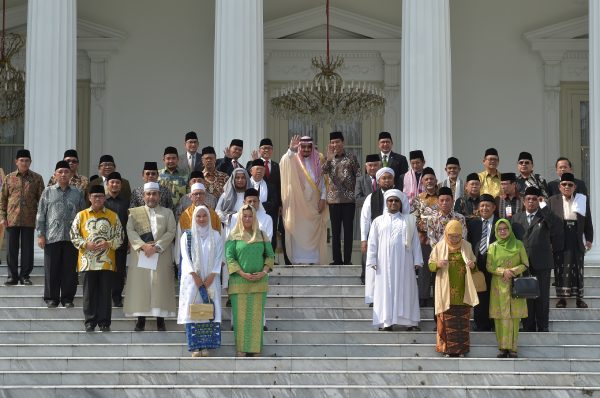Saudi Arabia is home to the puritan Wahabi movement. Indonesia, on the other hand, is largely seen as adopting a moderate and tolerant version of Islam, and is often praised as one of the success stories of democratisation in the Muslim world. So did the Saudi King want to learn about democracy from Indonesia? Of course not. The King is custodian of two holy places — Mecca and Madina — and is therefore unlikely to publically seek out lessons from Indonesia’s version of Islam. But on an informal level, Indonesia’s government and Muslim scholars have taught the King some valuable lessons.
First, the warm greetings from the Indonesian cabinet included a welcome from Puan Maharani, the Coordinating Minister for Welfare, a senior member of President Joko Widodo’s cabinet and daughter of former president Megawati Soekarnoputri. While Saudi Arabia has taken an important step in appointing Norah al-Faiz as the first woman to enter the government’s elite as Vice Minister for Education, King Salman has much to learn from Indonesia’s relative progression. Indonesian women have not only served their nation as senior ministers, but also as the president.
During his visit, the King posed for a photo with Puan Maharani and Megawati Soekarnoputri. This photo inundated the headlines in the Indonesian and Saudi media. A Saudi woman could never do that with their own King — they are not even allowed to drive a car or show their face in public. This sends a powerful message that Muslim women in Indonesia enjoy a higher status and role than their Saudi Arabian counterparts.
A second lesson for the King was during a side trip to Bali. Bali is mostly made up of Hindus and has been shocked by two major Islamic terrorist attacks in the past. Despite these barriers, the Balinese warmly welcomed the King to their island and their Hindu culture. This should send a powerful message of pluralism to the Middle East — people from different religious and cultural backgrounds can live side by side peacefully.
Another important question that arises from King Salman’s visit is whether Saudi Arabia’s image in Indonesia has recovered after the 2015 stampede at the annual Hajj pilgrimage in Mecca, which killed 129 Indonesians, and publicity about the mistreatment of Indonesian migrant workers. While the Saudi King and Indonesian President Joko Widodo signed 11 agreements on cooperation in sectors ranging from security to agriculture, both leaders avoided these more controversial questions.
While the King’s visit was considered a huge success by both governments, those angry about the mistreatment of Indonesian migrant workers and the Indonesian families waiting for compensation for the 2015 incident at the Hajj are still left wondering. The biggest achievements of the visit were the valuable lessons imparted on the King regarding pluralism and the position of women in Indonesia.
Nadirsyah Hosen is a Senior Lecturer at the Faculty of Law, Monash University. You can follow him on Twitter at @na_dirs.


Let’s not forget the increase over the last 30 years with the adoption of the jilbub/hijab by Indonesian women as a token of Saudi’s influence over the same period. Also the subsequent vacuousness of Indonesia’s modern “culture” of shopping malls thanks to “Western” influences. One wonders if Batik is the only remnant of originality in Jakarta. I find the notion that King Salman learned anything from a “liberal” Indonesian notion of women’s rights to be nearly preposterous. But then again when the standard is so utterly low to begin with…